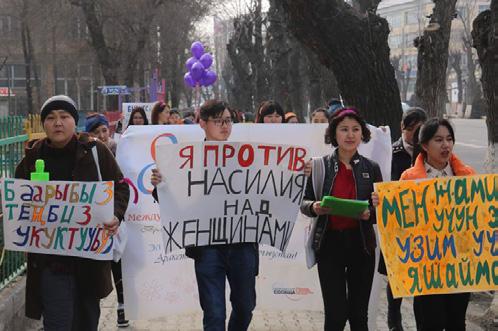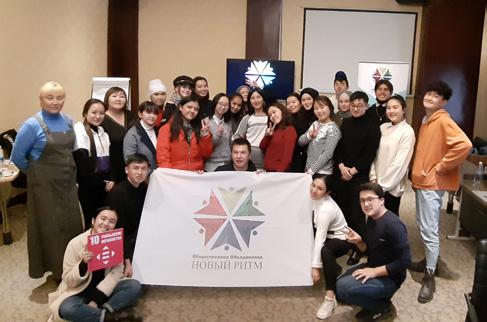
6 minute read
Gender equality
Context
Common across all Central Asian countries are the variety of restrictions placed upon women and girls. Gender hierarchies permeate all aspects of society, including family structures. This manifests itself in widespread violence against women and harsh gender norms which saturate and structure daily life. Even though several of the countries in the region have ratified the Convention of Eliminating all Forms of Discrimination Against Women (CEDAW) and the Beijing Declaration, women continue to be discriminated against both in public and in private. It is not uncommon for young girls to be pressured into marrying a stranger, or to be kidnapped and then forced to marry the abductor. For many, marriage at a young age forecloses educational and professional opportunities later in life. In Kyrgyzstan, where Central Asia Solidarity Groups has several years of experience working with local women’s rights activists, violence against women has not only increased but also become normalized and more widely accepted. Around 30% of women in Kyrgyzstan, and nearly 20% of women in Kazakhstan, have reported that they have experienced some form of gender-based violence. This rate is highest in Tajikistan, where 58.2% of women have been victims of gender violence. While there is no official data available on genderbased violence in Uzbekistan and Turkmenistan, reports suggest that the problem continues to be a problem in these countries as well. In all countries, the actual figures are expected to be higher based on the limited data and the suspicion that many instances of gender-based violence are underreported.
Advertisement
What we did during the year
In Central Asia, independent women’s movements are not welcomed by the state officials. Furthermore, such movements are blamed for the introduction of so-called “Westernized values” and thus encroaching on the traditional values of Central Asian society. Vocabulary containing domestic violence protection, non-discrimination and gender topics are included on the list of such “Westernized values”, and are thus condemned for being perceived as breaking more traditional principles of the country. The government has also introduced a number of legislative acts to control the work of independent NGOs.
On the 8th of March, Novi Ritm members, alongside Bishkek Feminist Initiatives, and together with local youth, organized the 3rd annual peaceful demonstrations dedicated to the International Women’s Day, in Osh city. Arranging these demonstrations proved to be challenging due to resistance from ethno-nationalist groups, such as “Kyrk Choro”. These groups strongly opposed the demonstrations, which were held in Kyrgyzstan’s capital, Bishkek. Some organizers, and their friends who were supporting the idea of the event, received threats on social media and were attacked physically. Based on these events, it was deemed risky for Novi Ritm members to hold demonstrations in Osh, a city which is even more conservative, traditional and religious. In fact, Novi Ritm was warned by some representatives of the local authority and the police to cancel the event, but local youth demanded their constitutional rights to arrange and participate freely in these peaceful demonstrations. As a result,

demonstrations, as well as an exhibition, were arranged with the support of local youth, authorities, police, media channels, and representatives of some other civil society organizations. More than 50 people gathered to raise issues about women’s and girls’ rights, particularly about domestic violence, bride kidnapping, sexual assault and reproductive health. By the end of the demonstrations, local young people had learned about existing gender issues and about the work of Novi Ritm and were interested in the events of the organization, including feminist talks and feminist movie screenings.
The event was held within the joint project of Central Asia Solidarity Groups and Novi Ritm focused on reducing the level of discriminatory norms in Kyrgyzstan - particularly in the southern region, where these norms are often most prevalent. The project is supported by Forum Syd.
Guzal Goes to School coloring book
Central Asia Solidarity Groups, together with our partner organization Children of Saint Petersburg, have finalized a joint project titled “Children’s Rights through Art” in August, 2019. The goal of this project was the creation of a comic book which would feature the story of Guzal, a young girl who has migrated with her family from Central Asia to Russia. In the book, Guzal struggles with (and eventually overcomes) gender-based stereotypes, and difficulties with the Russian school enrollment procedure, which impede her ability to go to school. After several exchange visits and numerous capacity-building activities that aimed to enhance the skills and knowledge of the “Gul” team to work with comics and design, the comic/coloring book was finally published. Titled Guzal Goes to School, the book was finalized in May. It has since been distributed online in Russia, Sweden, Kyrgyzstan and Poland. Two thousand hard copies were printed and handed out to children and families with migrational backgrounds in St Petersburg. The coloring book was also used during Children of Saint Petersburg’s annual summer camp which involved around 130 children in different activities.
Events during the 16-days of activism against gender-based violence
Members and volunteers of Novi Ritm, together with volunteers, initiated an awareness raising campaign named “Love or Control” that was inspired by the global campaign, 16 days of activism against gender based violence. The campaign included several activities including a youth conference in which invited speakers delivered speeches on the importance of civic activism, participation and involvement in solving socially important issues such as gender-based violence. Some other activities held by Novi Ritm include a crowdfunding campaign for one of the few functioning crisis centers for women and girls who were victims of violence in southern Kyrgyzstan. Currently, the center “Ak-Jurok” doesn’t have any projects and is at the stage of closing its shelter where they host victims of violence and their children. Accordingly, Novi Ritm tried to support with raising awareness about their work, talking about the needs of its stakeholders and searching for financial support from the community members. Moreover, discussions on reproductive health, masculinity norms, legislations against gender-based violence and quiz nights about the 16 days for local youth were arranged.
The campaign was financially supported within Central Asia Solidarity Groups and Novi Ritms’s joint project - Youth Agents for Change - Combating Discrimination based on gender, age and ethnicity.


Feminist Festival

One of larger events in Sweden that is held on annual basis - Feminist Festival - took place from October 11th to the 12th of this year in the city of Malmö. Central Asia Solidarity Groups were present at the information table this year. The Festival served as a great platform for our organization to raise awareness among locals and guests about our work, as well as providing information about Central Asia as a region, and, to some extent,Russia as well. At the same time, during the festival there was an opportunity to meet other civil society organizations, initiative groups and individuals working at local, national and international levels; to name few: RFSU, Amnesty International and Feminist Initiative.
Gender group study circle

During the spring of 2019, a study circle was organized for students and professionals interested in gender issues in Central Asia. The study circle aimed to offer an introduction to the region through the perspective of gender. It involved 21 participants from Sweden and other European countries. A total of seven meetings were conducted. Each meeting lasted for two hours and covered the context and gender-related issues in one Central Asian country. The first meeting offered a general overview of the region and the last meeting was dedicated to concluding discussions on the region’s gender challenges separately and in relation to participants’ experiences in other contexts. The participants were exposed to various news, reports, movies and podcasts on Central Asia that allowed for fruitful discussions to take place during the meetings. The lectures were delivered by scholars and activists with direct experience in the region. After the completion of the study circle, the participants reported an increase in acquired knowledge about the region.











